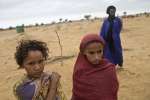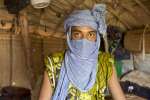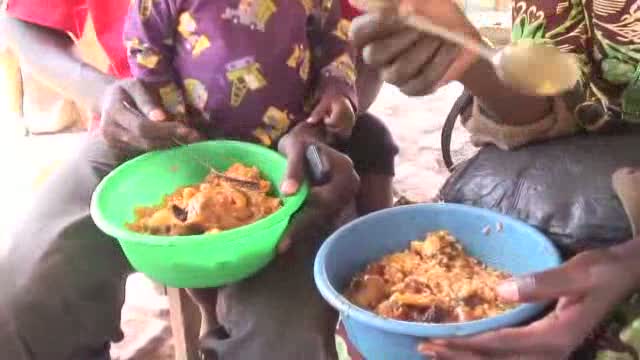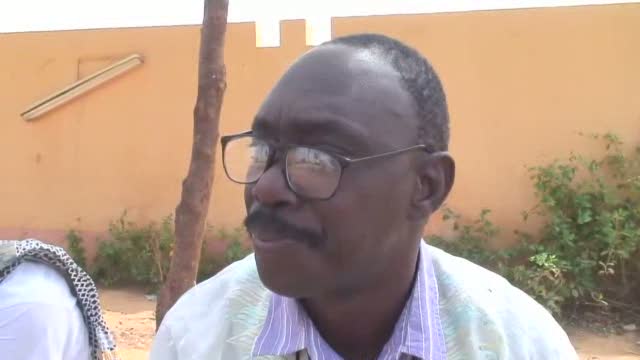- Text size
 |
|  |
|  |
| 
- Français
As security improves in Timbuktu, refugee family returns
News Stories, 27 January 2016
TIMBUKTU, Mali, Jan 27 (UNHCR) – Through the long years he was exiled by war, the thing Jafar missed most about his home in this fabled desert city was the ritual of sitting chatting with friends sipping glasses of sweet green tea as the day finally cooled.
For four years since conflict engulfed the desert north of Mali, he moved between temporary refuges and camps in neighbouring Burkina Faso, never feeling settled. Now, with the fighting over, he is finally home again in Timbuktu catching up with friends in the late afternoon sunlight.
Famed as a hub for trade and scholarship in the 1400s and 1500s, Timbuktu lies on the edge of the Sahara Desert northeast of Mali's capital Bamako. It was overrun by militants in 2012, who razed landmark buildings dating back to its Golden Age and drove thousands of residents into exile both within Mali and abroad.
"When I left Mali, it was chaos," said Jafar, 24, who is of Tuareg origin. "When I returned, I found a city that had resumed its economic activities. National and international security forces are present, as well as humanitarian ones. I found my neighbours, everything was fine with them. Our family has started to come back … from Burkina Faso."
Jafar is one of roughly 41,000 Malian refugees who have returned home as a fragile peace agreement signed in mid-2015 has taken hold. Many, however, find their homes ruined, their belongings looted, and their jobs gone. In some places, it is hard to find clean water and enough food. Prices of basic goods have skyrocketed.
UNHCR, the UN Refugee Agency, runs community reintegration projects that focus on education, health care, hygiene and water. Populations that remained are supported, as are the returning refugees.
During November and December 2015, 4,307 individuals received one-off cash payments of US$110 per adult and US$50 per child, as part of a financial assistance programme for people coming home. More than 800 repatriated refugees have been verified by UNHCR between August 2015 and January 2016.
Jafar was one of them, but nonetheless said it was a tough decision to leave the safety of the refugee camp where he and his family were living in Burkina Faso, and return to uncertainty.
"When I left the camp for Mali, I was anxious," Jafar said. "Not just because I was travelling an unknown route, but also because I did not want to leave a part of my life and close friends behind. We were very close and living together was good. But we wanted to return to Mali more than anything else."
While he was a refugee in Burkina Faso's Mentao refugee camp, Jafar had met and married his wife, Zeinabou, and together the couple had a baby daughter, Fadimata, who is now 18 months. After five years on the move, and with a young family to look after, the feeling of security now means everything to Jafar.
"It was a lack of safety that forced us to leave Mali," he said. "It is safety that we searched for in Burkina Faso. We found it in the refugee camps. And it is because I knew that Timbuktu had again become safer that I decided to return there with my family."
His main worry is the lack of employment. He desperately needs to support his family, to pay rent, school fees, and for his wife's nursing studies. Before he fled, he was studying and paying his way with contracts as a driver for aid agencies and private clients. Now, he says, "any work will do."
"With my high school education and the experience I acquired at the camp, I plan to do humanitarian work," he said. "But I no longer have any specific contacts in Timbuktu, so it will be difficult to find a job if I do not have a diploma that reflects my skill level. In the meantime, I need to cover our expenses."
These are the difficulties that are keeping many of the 140,000 Malians who are still refugees in neighbouring Niger, Mauritania and Burkina Faso, and the 62,000 who are displaced inside their own country, from going home.
The security situation in northern Mali also remains volatile. The 2012 conflict officially ended with peace agreements in June 2015, but attacks by criminals and militants, as well as human rights violations, persist. Access to some areas where people want to return to remains difficult for aid agencies.
Some refugees may be returning, but other people still feel sufficiently threatened in Mali that they continue to leave. More than 4,300 fled to Niger between July and the end of December 2015, and between January and November another 2,300 Malians arrived in Burkina Faso.
"The security situation is still volatile. Nonetheless, we observe since 2013 that Malians who had found refuge in the sub-region continue to spontaneously return to their areas of origin," said Nsona Vela do Nascimento, senior repatriation officer in the UNHCR office in Bamako.
Vela do Nascimento stressed that UNHCR continues to provide protection and assistance to Malians whether in exile or upon their return, and worked with partners "to ensure smooth reintegration of returnees either through targeted assistance to the most vulnerable ones, or through community projects that support social cohesion in those areas."
For now, Jafar is positive about the future, and encourages other Malians to return to help reconstruct what was destroyed. "We are starting to rebuild our lives little by little," he said.
By Isabelle Michal in Mali and Paul Absalon in Burkina Faso















































